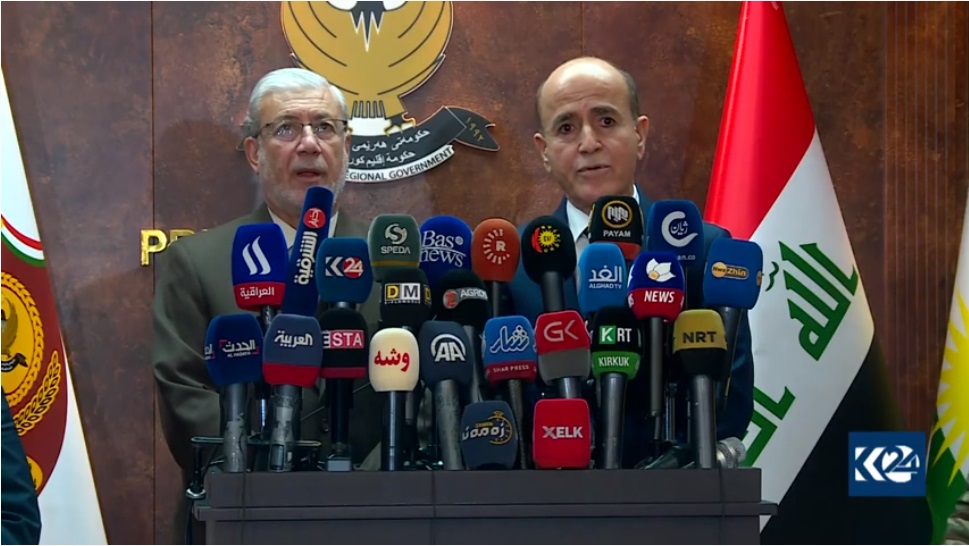Iraqi MP, Peshmerga Minister stress role of Peshmerga in maintaining security in disputed areas

ERBIL (Kurdistan 24) – The second deputy speaker of the Iraqi parliament, Bashir Haddad, on Monday, expressed his optimism about the dialogue between Erbil and Baghdad which is aimed at resolving security issues in the disputed territories.
In a joint press conference, the Kurdistan Regional Government’s (KRG’s) Minister of Peshmerga Affairs, Shorsh Ismail, and parliament member Bashir Haddad, a Turkmen member of the Kurdistan Democratic Party (KDP), expressed their concern regarding ISIS’ increasing activity in the disputed areas, as well as the demographic changes taking place there.
"Our problem regarding the budget is not with the Iraqi government, but with the political parties in parliament. We need more discussion with them to pass these laws," said Haddad, referring to the 2021 draft budget law that has been approved by the Iraqi government and sent to the parliament.
A KRG negotiating team visiting Baghdad announced on Dec. 22 that it had succeeded in reaching an agreement with the federal government regarding the national 2021 draft budget law.
Read More: KRG, Baghdad reach deal on 2021 budget law: Deputy PM
Haddad added, "Preparations are underway for a Kurdish delegation to go to Baghdad to hold talks with the political parties," as he stressed, "there are no guarantees they will pass the budget law, but we, as Kurdish parties, will make all our efforts to pass this law as the KRG has demonstrated its commitment to the law since 2019.”
For his part, the Minister of Peshmerga Affairs said, "We are trying to strengthen the role of coordination centers between Baghdad and Erbil, because we are sure that there are many political and security problems that would not have arisen, if there were a presence of the Peshmerga forces in the disputed territories.”
“There are areas that are subject to an Arabization campaign, and the return of the Peshmerga is in the interest of the political process, as well as in the interest of securing those areas and all its components: Arabs, Kurds, and Turkmen," Ismail added.
Ismail explained that since the Peshmerga are no longer in those areas, ISIS has resurged, terrorizing the people. “I’m positive that if Peshmerga forces, which are officially recognized in the Iraqi armed forces, were there, there would be no security or social issues,” he said.
Ismail also expressed optimism about the 2021 draft federal budget law, because it includes the money due to the Peshmerga, which was “increased, because the Peshmerga are part of the Iraqi defense system."
Since Baghdad’s attack on Kirkuk and other disputed areas in October 2017, Arabs have been brought to the province from different regions of the country in an attempt to bring about demographic changes.
The campaign is meant to alter the population of the area by forcibly displacing the Kurdish residents and replacing them with Arabs from central and southern Iraq.
Kirkuk, an ethnically diverse province, comprised of Turkmen, Arabs, Christians, with a Kurdish majority, is claimed by both the KRG and Iraq’s federal government.
The former Iraqi Ba’athist regime, under Saddam Hussein’s dictatorship, carried out extensive Arabization campaigns in Kirkuk province and other Kurdish-populated areas in Nineveh, Salahuddin, and Diyala provinces.
After the US ousted Saddam in 2003, the lands were given back to their Kurdish and Turkmen owners, while the Arabs, whom Saddam had brought to the area, left in exchange for a sum of money promised by the new Baghdad government.
Yet security in Kirkuk and the other disputed territories has been declining, since Baghdad forced the withdrawal of the Kurdish Peshmerga Forces, which had been protecting those areas for many years.
Subsequently, allegations of the forced displacement of Kurds began to emerge. Allegedly, Kurdish landowners are regularly told to vacate their properties by Arab claimants who present Saddam-era documents to justify their demands.
Editing by Laurie Mylroie